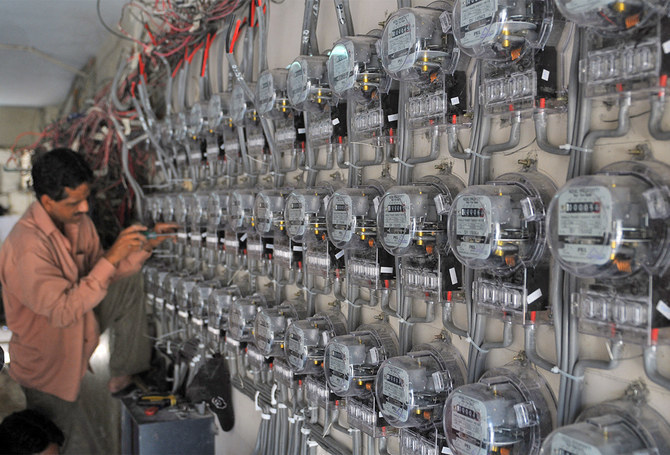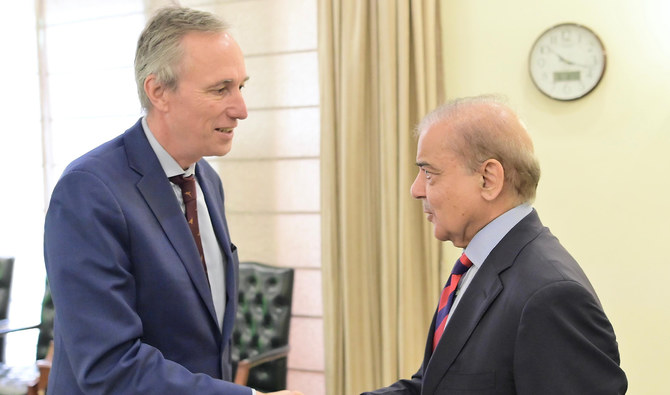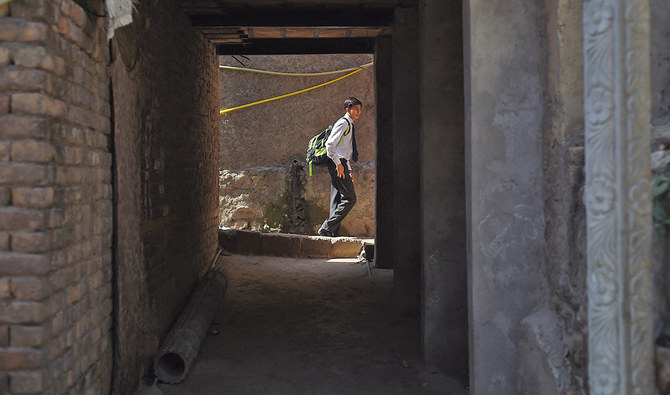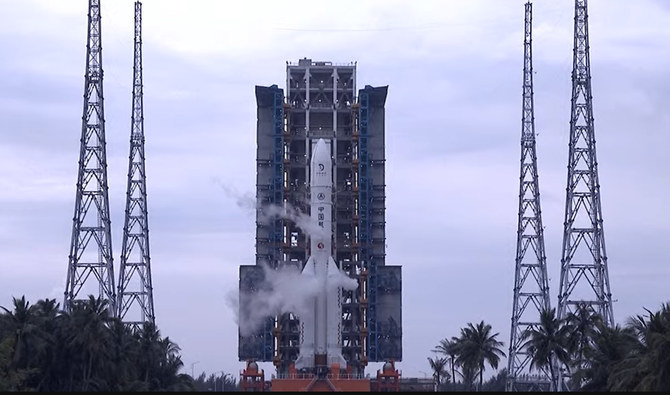ISLAMABAD/KARACHI: Pakistanis on Sunday organized a hike in the federal capital of Islamabad to reiterate their demands for the government to take “concrete steps” to pressure Israel for a ceasefire in Gaza and the establishment of a humanitarian assistance corridor to the war-torn territory.
The development came as the Palestinian health ministry said at least 34,097 people had been killed during more than six months of Israel’s war on Gaza. Another 76,980 people had been wounded in the Gaza Strip since the war began when Hamas militants attacked Israel on Oct. 7.
The hike at Islamabad’s Trail 3 was organized by the Save Gaza Campaign, a civil society movement that advocates for an immediate ceasefire in Gaza, and attended by a large number of Pakistanis, including politicians, civil society members, journalists and students.
“Today, we have organized this hike through which we want to give this message that we will talk about Gaza,” Humaira Tayyaba, one of the organizers of the event, told Arab News.
“We are hiking to raise awareness about the real issue and to what extent we can go for this issue, so they [Pakistani youth] can know of it through this informal way.”
The organizers said their protests had been entirely peaceful and had drawn the attention of Pakistanis across the country.
“Our campaign, Save Gaza, started on 13th November and we have been continuously organizing peaceful protests,” Tayyaba said. “Our campaign is moving forward with more Pakistani people joining and emotionally connecting with Palestine.”
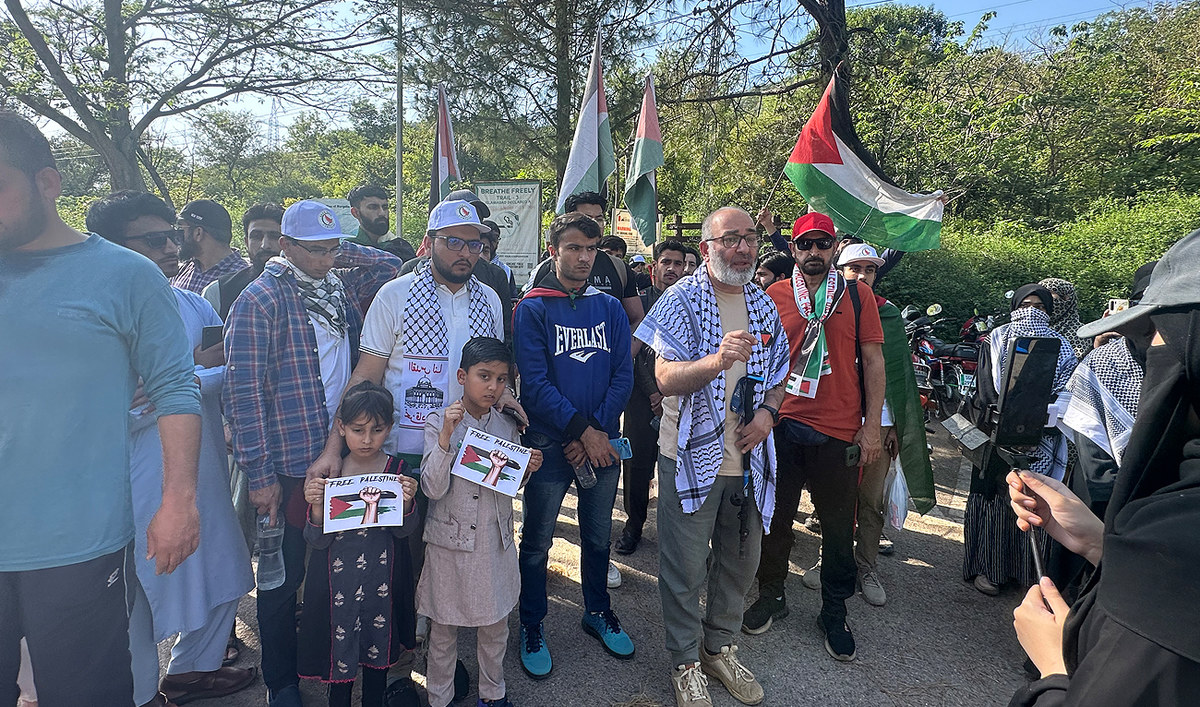
Mushtaq Ahmed, a former Pakistani senator, speaks ahead of the Save Gaza campaign walk through Margalla Hills trail in Islamabad on April 21, 2024, to demand a "ceasefire" in the Gaza Strip. (AN Photo)
Mushtaq Ahmed, a former Pakistani senator, demanded the Pakistani government raise the issue of Israel’s alleged war crimes against the Palestinians in the International Court of Justice (ICJ).
“We also demand the government of Pakistan demarche the American ambassador in Pakistan because recently the Americans announced that they are giving $17 billion aid to Israel, which will be used for aircraft, missile technology, tanks and ammunition to kill the innocent Palestinians,” he told Arab News.
Maryam Nazir, media director of the Save Gaza Campaign, said their primary demand was an immediate ceasefire in the besieged territory.
“South Africa is in the International Court of Justice at the Hague for a ceasefire. At least, [Pakistan] should submit a declaration [in the ICJ] of intervention against Israel,” she told Arab News.
Nazir said their efforts would continue and the Pakistani government would have to respond to their demands.
Pakistan does not recognize the state of Israel and maintains its support for an independent Palestinian state with Jerusalem as its capital, based on pre-1967 borders.
The South Asian country has repeatedly raised the issue of Israel’s war on Gaza at the United Nations through its permanent representative, Ambassador Munir Akram.

Children hold posters, saying "Free Palestine," as Mushtaq Ahmed, a former Pakistani senator, speaks ahead of the Save Gaza campaign walk through Margalla Hills trail in Islamabad on April 21, 2024, to demand a "ceasefire" in the Gaza Strip. (AN Photo)
‘Martyrs of Gaza Conference’
In the southern Pakistani city of Karachi, hundreds of people attended a rally, titled ‘Martyrs of Gaza Conference,’ on Sunday to urge the international community to halt Israeli strikes against the Palestinians. The conference was organized by the Pakistan Markazi Muslim League (PMML) party.
“Two hundred days have passed since the Israeli bombardment began in Gaza, while the entire world has become a silent spectator. I urge them to stop Israel from committing genocide against Palestinians,” said Nadeem Awan, the PMML Karachi general secretary.
“We believe that Pakistan, along with other Muslim states, can play a crucial role in raising the voice for Palestine.”
Isaar Babar, a 27-year-old teacher, said he participated in the rally to let the Palestinians know that Pakistanis stood by them.
“As you know, injustice prevails, and we are here to express solidarity with the people of Palestine, so that our brothers and sisters may know that their Pakistani counterparts stand with them,” he said.
Shaista Noor, another attendee, said Pakistanis couldn’t go to Palestine, but they could support Palestinians by boycotting Israeli products and companies that supported the Jewish state.
“We can boycott Israeli products. We can boycott products that help Israel in one way or another,” she added.





